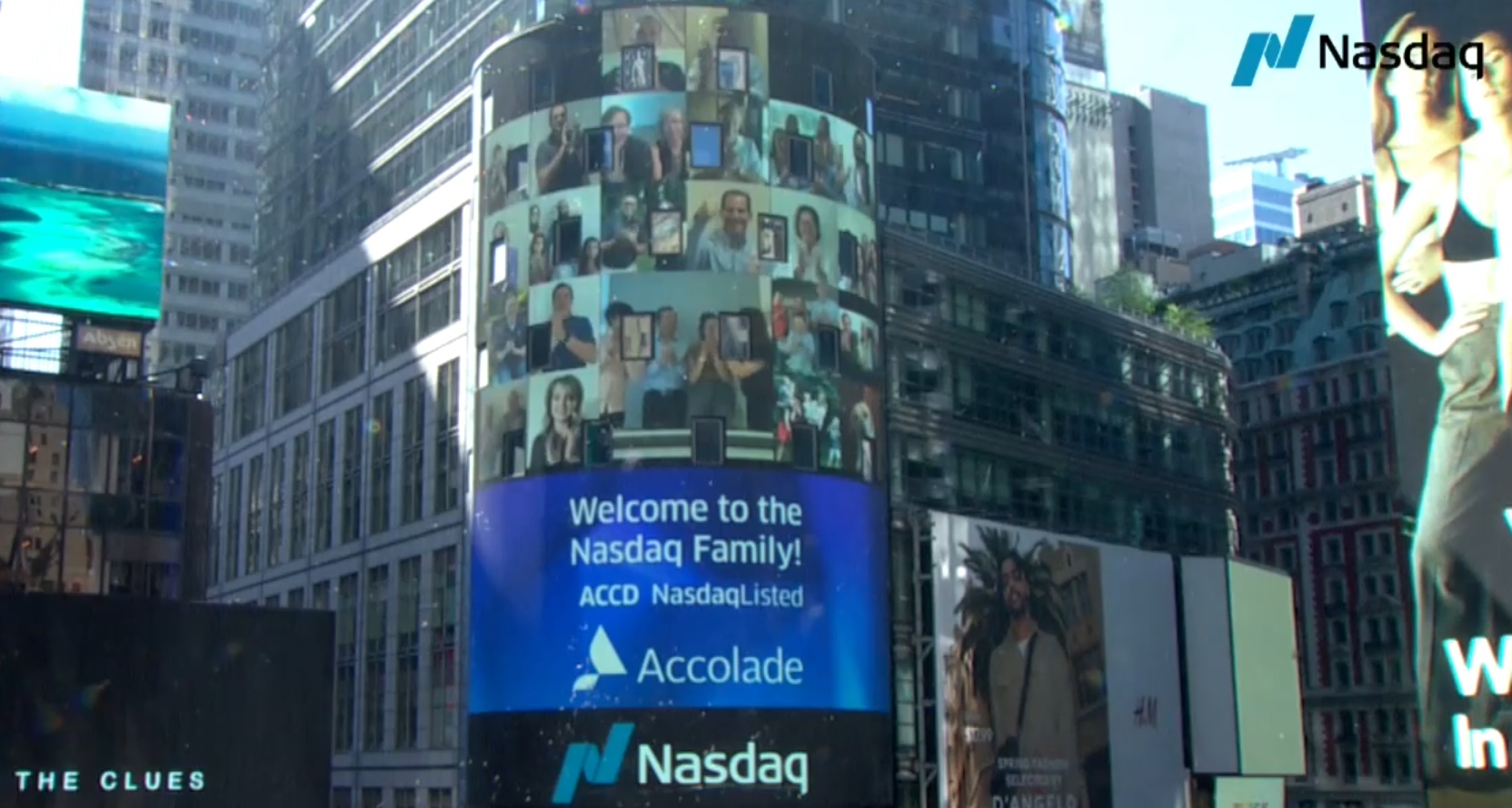
Accolade employees virtually celebrated its public debut in a video streamed in Times Square. The employee benefits platform will be listed on Nasdaq as “ACCD.”
Accolade employees virtually rang the opening bell on Thursday morning, when the employee benefits platform made its debut on the stock market. The company’s stock began trading on Nasdaq under “ACCD”, where it opened at $35 per share. Accolade had initially planned to price its stock between $19 and $21, but bumped up the target price to $22 for its IPO.
The company is offering just over 10 million shares of its common stock for a total of $220 million, valuing the company at $1.2 billion.

Solving Healthcare’s Provider Data Problem Starts with Interoperability
Break down the silos. Take control of your provider data.
Accolade had filed its initial paperwork in late February, “which in hindsight, was tough timing,” CFO Steve Barnes said in a phone interview. “Obviously, the world changed a lot in March.”
As the Covid-19 pandemic continued, more employers began inquiring about its services.
“What we’ve found is our own customers and prospective customers are realizing this isn’t just a nice employee benefit to have,” Barnes said.
Although the Covid-19 pandemic has put a bigger spotlight on healthcare, the resulting economic downturn has also put many companies under financial pressure. Some employers have invested more in benefits, adding telehealth solutions and searching for tools that can help them create a safe work environment. Others are too financially strained to add much.

What Are Healthcare Organizations Getting Wrong about Email Security?
A new report by Paubox calls for healthcare IT leaders to dispose of outdated assumptions about email security and address the challenges of evolving cybersecurity threats.
Accolade helps navigate employees through their health benefits using technology and health assistants. Its goal is to reduce costs by encouraging “good” utilization of the healthcare system, such as having a primary care physician or adhering to medications.
For example, a user could call in to ask whether a chiropractor visit is covered under their health plan or get help finding a provider. If they were considering back surgery, a health assistant might suggest that they consider their company’s covered physical therapy solution.
Accolade has a handful of competitors in the space, including Castlight Health and Welltok. Castlight has struggled since it went public in 2014, with its stock dipping below $1 in recent months.
Omers Ventures Managing Partner Michael Yang, who previously led an investment in Accolade while at Comcast Ventures, said Accolade works differently than most other benefits platforms. Instead of focusing on just one aspect of health benefits or only answering certain questions, Accolade will field any question from employees, whether it’s prescription costs or simply understanding how to read an explanation of benefits.
“They were willing to roll with whatever sort of inquiries you had. What that did was create a trusted relationship that allowed Accolade to guide member utilization over time,” he said. “That’s just not the same orientation as others.”
That relationship also positions them to inform users about new benefits, such as telehealth tools or behavioral health services, Yang said.
Accolade, which splits its offices between Seattle and Plymouth Meeting, Pennsylvania, has netted some big name clients, including American Airlines, Comcast Cable, Lowe’s and State Farm.
The downside: Those clients also make up a big share of its business, at 56% of its revenue. Accolade currently serves a total of 1.6 million members across more than 58 companies, charging at a per-member per-month rate.
Accolade plans to reinvest the proceeds of the IPO into growing its business and repaying its debt. The company saw its revenue grow 40% from last year, for a total of $132.5 million in February.
Accolade currently has $73.2 million in debt on its books, a number that has increased since the pandemic started, and has operated at a net loss in recent years.
Barnes said the company would continue to take demonstrable steps toward profitability, while still investing in its technology.
“We’re on the path to getting there,” he said. “It’s important to do this in a way that continues to innovate.”
Accolade’s public offering is expected to close on July 7. Goldman Sachs & Co. LLC, Morgan Stanley, and BofA Securities served as joint book-running managers.
Photo credit: Screenshot from Nasdaq
This article has been updated with comments from Michael Yang of Omers Ventures.






